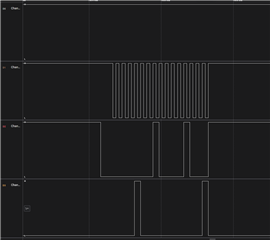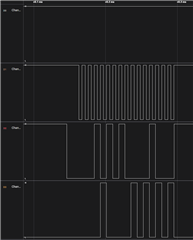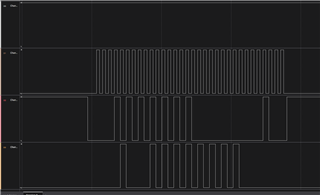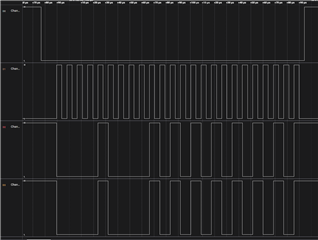Tool/software:
Hi,
I am using TMS320F28035MPNTEP microcontroller and DAC DAC80504RTET. Trying to communicate using SPIA.
I tried to read Device ID of DAC from "Device ID register" and got garbage value. So started checking SPI signals. Chip select is not going low during data transfer. Below is the code and screenshot of signal
void spi_configureSPIAModule(void)
{
EALLOW;
GpioCtrlRegs.GPAMUX2.bit.GPIO16 = 1; // SPISIMOA (MOSI)
GpioCtrlRegs.GPAMUX2.bit.GPIO17 = 1; // SPISOMIA (MISO)
GpioCtrlRegs.GPAMUX2.bit.GPIO18 = 1; // SPICLKA (CLK)
GpioCtrlRegs.GPAMUX2.bit.GPIO19 = 1; // SPISTEA (CS)
GpioCtrlRegs.GPAPUD.bit.GPIO16 = 0;
GpioCtrlRegs.GPAPUD.bit.GPIO17 = 0;
GpioCtrlRegs.GPAPUD.bit.GPIO18 = 0;
GpioCtrlRegs.GPAPUD.bit.GPIO19 = 0;
// SPI configuration
SpiaRegs.SPICCR.bit.SPISWRESET = 0; // Hold SPI in reset
SpiaRegs.SPICCR.all = 0x0047; // 16-bit char, no loopback
SpiaRegs.SPICTL.all = 0x000E; // Master mode, enable TX, Falling edge data capture
SpiaRegs.SPIBRR = 0x007F; // SPI baud rate ~468.75kHz @ 60MHz
SpiaRegs.SPICCR.bit.SPISWRESET = 1; // Release SPI
SpiaRegs.SPIPRI.bit.FREE = 1; // Free run mode
EDIS;
}
void spi_writeToDAC(Uint8 regAddr, Uint16 value)
{
Uint8 cmdByte = 0;
Uint16 word1 = 0;
Uint16 word2 = 0;
// Bit 23 = 0 (Write), Bits 22–20 = 000 (reserved), Bits 19–16 = register address
cmdByte = (regAddr & 0x0F);
// Build 24-bit frame as two 16-bit writes (MSB first)
word1 = (cmdByte << 8) | ((value >> 8) & 0xFF); // First 16 bits: [Command][Data[15:8]]
word2 = (value & 0xFF) << 8; // Last 8 bits: [Data[7:0]] in upper byte
GpioDataRegs.GPACLEAR.bit.GPIO19 = 1; // CS low
// Send word1
SpiaRegs.SPITXBUF = word1;
while (SpiaRegs.SPISTS.bit.INT_FLAG == 0);
SpiaRegs.SPISTS.all = 0x0000;
// Send word2
SpiaRegs.SPITXBUF = word2;
while (SpiaRegs.SPISTS.bit.INT_FLAG == 0);
SpiaRegs.SPISTS.all = 0x0000;
GpioDataRegs.GPASET.bit.GPIO19 = 1; //CS high
}
Captured below screenshot when I tried to write value 1 (spi_writeToDAC(0x08, 0x1);)
channel 0 is CS
Channel1 is CLK
Channel 2 is SPIA_MISO_DAC (SDO)
Channel 3 is SPIA_MOSI_uCtoDAC (SDI)

Captured below screenshot when I tried to write value 0x5555 (spi_writeToDAC(0x08, 0x5555);)

I am unable to find the issue with my code. Can you please help.
I tried configuring GPIO19 as GPIO instead of SPISTEA but did not get any signal on Channel 3 (SDI)



